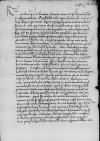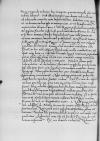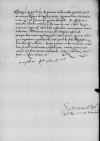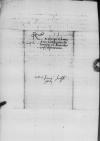Reddidit mihi Simon Hannau (Simon Hannow), Dantiscus' nephew, son of Anna von Höfen and Johann Hannau, brother of Johann and Kaspar; at the turn of 1538 administrated bishop's estate in Löbau (Lubawa) in Dantiscus' name (CEID 1/1, p. 344, footnote No. 19)⌊neposSimon Hannau (Simon Hannow), Dantiscus' nephew, son of Anna von Höfen and Johann Hannau, brother of Johann and Kaspar; at the turn of 1538 administrated bishop's estate in Löbau (Lubawa) in Dantiscus' name (CEID 1/1, p. 344, footnote No. 19)⌋ Reverendissimae Dominationis Vestrae et cf. Ioannes DANTISCUS to Samuel MACIEJOWSKI 1541-06-11 — 1541-06-14, CIDTC IDL 7467, letter lost⌊litterascf. Ioannes DANTISCUS to Samuel MACIEJOWSKI 1541-06-11 — 1541-06-14, CIDTC IDL 7467, letter lost⌋ illius, et pecuniam. Agnosco singularem in me benevolentiam Reverendissimae Dominationis Vestrae, quae tanto studio me sublevatum cupit, ut difficillimis temporibus his cum dignitate in aula versari queam. Ego etsi me gratum singulis libenter praestabo, qui sua me liberalitate prosequendum putaverunt, tamen cum universa ab auctore Reverendissima Dominatio Vestra sit profecta, illi me ante omnes hoc nomine debere profiteor ac quibuscumque rebus potero, gratum animum erga illam meum declarabo.
Salvi conductus prorogationem, quam Reverendissima Dominatio Vestra postulat pro Hans Holsten (†after 1548)⌊Ioanne HolsteinHans Holsten (†after 1548)⌋, mitto. Si quid secus illi scribendum videbitur, admoneat me licebit.
Domino Ioannes Stutte (*1494 – †1554), relative to Tiedemamnn Giese (husband of Anna Giese); 1522-1525, 1526 Gdańsk alderman; 1531 - senior; 1531 - town councillor; 1535 - judge; 1541, 1548, 1552 - burgrave; 1550 mayor (ZDRENKA 2, p. 337-338)⌊Ioanni StutteIoannes Stutte (*1494 – †1554), relative to Tiedemamnn Giese (husband of Anna Giese); 1522-1525, 1526 Gdańsk alderman; 1531 - senior; 1531 - town councillor; 1535 - judge; 1541, 1548, 1552 - burgrave; 1550 mayor (ZDRENKA 2, p. 337-338)⌋ libenter sum gratificatus et Vestrae Reverendissimae Dominationis et Tiedemann Giese (Tidemannus Gisius) (*1480 – †1550), in 1519 ennobled by King Sigismund I; 1504-1538 Canon of Ermland (Warmia); 1516-1527, 1533-1537 Judicial Vicar and Vicar General of Ermland; 1523-1538 Custos of Ermland; 1537-1549 Bishop of Kulm (Chełmno); 1549-1550 Bishop of Ermland (BORAWSKA 1984, passim)⌊domini CulmensisTiedemann Giese (Tidemannus Gisius) (*1480 – †1550), in 1519 ennobled by King Sigismund I; 1504-1538 Canon of Ermland (Warmia); 1516-1527, 1533-1537 Judicial Vicar and Vicar General of Ermland; 1523-1538 Custos of Ermland; 1537-1549 Bishop of Kulm (Chełmno); 1549-1550 Bishop of Ermland (BORAWSKA 1984, passim)⌋ causa. Ipsi etiam Tiedemann Giese (Tidemannus Gisius) (*1480 – †1550), in 1519 ennobled by King Sigismund I; 1504-1538 Canon of Ermland (Warmia); 1516-1527, 1533-1537 Judicial Vicar and Vicar General of Ermland; 1523-1538 Custos of Ermland; 1537-1549 Bishop of Kulm (Chełmno); 1549-1550 Bishop of Ermland (BORAWSKA 1984, passim)⌊reverendissimo domino CulmensiTiedemann Giese (Tidemannus Gisius) (*1480 – †1550), in 1519 ennobled by King Sigismund I; 1504-1538 Canon of Ermland (Warmia); 1516-1527, 1533-1537 Judicial Vicar and Vicar General of Ermland; 1523-1538 Custos of Ermland; 1537-1549 Bishop of Kulm (Chełmno); 1549-1550 Bishop of Ermland (BORAWSKA 1984, passim)⌋ declarationem mitto iis ipsis verbis, quae in scheda fuerunt, scriptam.
Gulielmus Gnapheus (Willem de Volder, Gulielmus Hagensis, Willem van de Voldersgraft) (*1493 – †1568), Dutch humanist, playwright; Catholic priest, then adherent to the Reformation; rector of the Gymnasium in the Hague; imprisoned twice, in 1531 emigrated to Prussia; 1535-1541 first rector of the Gymnasium in Elbing; 1541-1547 lived and taught in Königsberg; from 1547 to death stayed in East Frisia (i.al. as secretary to Countess Anna of Oldenburg and educator of her sons) (ORACKI 1984, p. 69; PAWLAK 1987)⌊GnapheoGulielmus Gnapheus (Willem de Volder, Gulielmus Hagensis, Willem van de Voldersgraft) (*1493 – †1568), Dutch humanist, playwright; Catholic priest, then adherent to the Reformation; rector of the Gymnasium in the Hague; imprisoned twice, in 1531 emigrated to Prussia; 1535-1541 first rector of the Gymnasium in Elbing; 1541-1547 lived and taught in Königsberg; from 1547 to death stayed in East Frisia (i.al. as secretary to Countess Anna of Oldenburg and educator of her sons) (ORACKI 1984, p. 69; PAWLAK 1987)⌋ ad importunam petitionem Elbingensium datus est salvus conductus dierum 35, ut interea vasa colligeret nominaque sua exigeret. Quod si quid interim cum eo tractare volet Reverendissima Dominatio Vestra, erit hoc illius arbitrii.
Barbara, wife of Wolfgang FOLDER ⌊BarbaraeBarbara, wife of Wolfgang FOLDER ⌋, non video, qua possit alia ratione succurri, quam mandato, quod in manus Reverendissimae Dominationis Vestrae mitto. Quod si aliter interpretandum putaverit, sententiam Council of Royal Prussia the most important local authority in Royal Prussia. It consisted of two bishops (of Ermland (Warmia), who served as the Council’s president, and of Kulm (Chełmno)), three voivodes (of Kulm, Marienburg (Malbork), and Pomerania), three castellans (of Kulm, Elbing (Elbląg), and Gdańsk (Danzig)), three chamberlains (of Kulm, Marienburg, and Pomerania), and representatives of the three Great Prussian Cities – Gdańsk, Thorn (Toruń), and Elbing (ACHREMCZYK 2016, p. 17-18)⌊dominorum consiliariorumCouncil of Royal Prussia the most important local authority in Royal Prussia. It consisted of two bishops (of Ermland (Warmia), who served as the Council’s president, and of Kulm (Chełmno)), three voivodes (of Kulm, Marienburg (Malbork), and Pomerania), three castellans (of Kulm, Elbing (Elbląg), and Gdańsk (Danzig)), three chamberlains (of Kulm, Marienburg, and Pomerania), and representatives of the three Great Prussian Cities – Gdańsk, Thorn (Toruń), and Elbing (ACHREMCZYK 2016, p. 17-18)⌋ reddet me certiorem.
Edicta, quae Reverendissima Dominatio Vestra postulavit, misi per Ludovicum. Quod spe nostra de contributione frustrati sumus, facile perspicio, penes quos eius rei culpa fuerit. Neque in ea conficienda studium Reverendissimae Dominationis Vestrae defuisse. Quae de hac re scripsit ad me Reverendissima Dominatio Vestra, narravi sacrae Sigismund I Jagiellon (Zygmunt I) (*1467 – †1548), King of Poland and Grand Duke of Lithuania (1506-1548); Duke of Głogów (Glogau) (1499-1506), Duke of Opava (1501-1506), Governor of Silesia (1504-1506); son of King Kazimierz IV Jagiellon and Elisabeth of Austria⌊maiestati regiaeSigismund I Jagiellon (Zygmunt I) (*1467 – †1548), King of Poland and Grand Duke of Lithuania (1506-1548); Duke of Głogów (Glogau) (1499-1506), Duke of Opava (1501-1506), Governor of Silesia (1504-1506); son of King Kazimierz IV Jagiellon and Elisabeth of Austria⌋ omnia. Sigismund I Jagiellon (Zygmunt I) (*1467 – †1548), King of Poland and Grand Duke of Lithuania (1506-1548); Duke of Głogów (Glogau) (1499-1506), Duke of Opava (1501-1506), Governor of Silesia (1504-1506); son of King Kazimierz IV Jagiellon and Elisabeth of Austria⌊CuiSigismund I Jagiellon (Zygmunt I) (*1467 – †1548), King of Poland and Grand Duke of Lithuania (1506-1548); Duke of Głogów (Glogau) (1499-1506), Duke of Opava (1501-1506), Governor of Silesia (1504-1506); son of King Kazimierz IV Jagiellon and Elisabeth of Austria⌋ grata fuit fides haec illius, studium et observantia erga se atque erga Poland (Kingdom of Poland, Polonia)⌊rei publicaePoland (Kingdom of Poland, Polonia)⌋ utilitatem. Sed cum langueat hoc tempore et natura ipsa minus celeriter respondere soleat, neque nisi bene prius rebus deliberatis, nullum ab ea responsum adhuc tuli,  BCz, 1597, p. 1262 neque urgenda videtur hoc tempore, quo incommoda ista valetudine laborat. Sub illud tempus, quo denuo cubicularius ad edicenda comitia cum litteris mittetur, dabitur a me opera, ut reducam eadem ipsa in memoriam et ut honesta ratio reperiatur aliqua, qua sacrae Sigismund I Jagiellon (Zygmunt I) (*1467 – †1548), King of Poland and Grand Duke of Lithuania (1506-1548); Duke of Głogów (Glogau) (1499-1506), Duke of Opava (1501-1506), Governor of Silesia (1504-1506); son of King Kazimierz IV Jagiellon and Elisabeth of Austria⌊maiestatis regiaeSigismund I Jagiellon (Zygmunt I) (*1467 – †1548), King of Poland and Grand Duke of Lithuania (1506-1548); Duke of Głogów (Glogau) (1499-1506), Duke of Opava (1501-1506), Governor of Silesia (1504-1506); son of King Kazimierz IV Jagiellon and Elisabeth of Austria⌋ postulationi satisfiat.
BCz, 1597, p. 1262 neque urgenda videtur hoc tempore, quo incommoda ista valetudine laborat. Sub illud tempus, quo denuo cubicularius ad edicenda comitia cum litteris mittetur, dabitur a me opera, ut reducam eadem ipsa in memoriam et ut honesta ratio reperiatur aliqua, qua sacrae Sigismund I Jagiellon (Zygmunt I) (*1467 – †1548), King of Poland and Grand Duke of Lithuania (1506-1548); Duke of Głogów (Glogau) (1499-1506), Duke of Opava (1501-1506), Governor of Silesia (1504-1506); son of King Kazimierz IV Jagiellon and Elisabeth of Austria⌊maiestatis regiaeSigismund I Jagiellon (Zygmunt I) (*1467 – †1548), King of Poland and Grand Duke of Lithuania (1506-1548); Duke of Głogów (Glogau) (1499-1506), Duke of Opava (1501-1506), Governor of Silesia (1504-1506); son of King Kazimierz IV Jagiellon and Elisabeth of Austria⌋ postulationi satisfiat.
De episcopatu Plocensi nihil est, quod iam laboret Reverendissima Dominatio Vestra. Etsi enim summo studio impediebant, qui sibi summam rerum omnium vendicant potestatem, monstravit tamen se regem esse sacra Sigismund I Jagiellon (Zygmunt I) (*1467 – †1548), King of Poland and Grand Duke of Lithuania (1506-1548); Duke of Głogów (Glogau) (1499-1506), Duke of Opava (1501-1506), Governor of Silesia (1504-1506); son of King Kazimierz IV Jagiellon and Elisabeth of Austria⌊maiestas regiaSigismund I Jagiellon (Zygmunt I) (*1467 – †1548), King of Poland and Grand Duke of Lithuania (1506-1548); Duke of Głogów (Glogau) (1499-1506), Duke of Opava (1501-1506), Governor of Silesia (1504-1506); son of King Kazimierz IV Jagiellon and Elisabeth of Austria⌋ et suam erga me non vulgarem gratiam declaravit cumque aliis in rebus cunctator esse soleat, in hoc mihi episcopatu mandando nulla cunctatione est usus, neque dum ex capitulo Plocensi legati venirent, exspectavit, qui in hunc usque diem etiam non venerunt, cuius consiliis adducti, odore quodam consequor. Detulit illum mihi liberaliter ac detulisset fortassis eo ipso die, quo de morte Jakub Buczacki (†1541), 1502 royal secretary; 1505 parish priest in Lublin; 1518 dean of the Lviv chapter; 1507 bishop of Kamieniec; 1518 - Chełm; 1538 - Płock; 1507 royal envoy to Gdańsk and to Bogusław X duke of Pomerania (WYCZAŃSKI 1990, p. 248; PSB 3, p. 82)⌊episcopiJakub Buczacki (†1541), 1502 royal secretary; 1505 parish priest in Lublin; 1518 dean of the Lviv chapter; 1507 bishop of Kamieniec; 1518 - Chełm; 1538 - Płock; 1507 royal envoy to Gdańsk and to Bogusław X duke of Pomerania (WYCZAŃSKI 1990, p. 248; PSB 3, p. 82)⌋ allatum fuit, nisi legatus commodum venisset domini Piotr Gamrat (*1487 – †1545), 1509-1518 parish priest in Wyszków; 1519 scholastic of Płock; 1526 Gniezno canon; 1528 dean of Płock; 1529 Warsaw scholastic; 1532-1538 general commissioner and admistrator of Crown lands in Masovia; provost at the chapter of St. Florian in the Kleparz district in Cracow, and later of St. Michael in Płock; 1531 bishop of Kamieniec; 1532 Dean of Warsaw; 1535 bishop of Przemyśl; 1538 - of Płock; 1538 - of Cracow; 1541 archbishop of Gniezno and primate (with the approval of the Holy See he retained the bishopric of Cracow) (PSB 7, 264-266)⌊archiepiscopiPiotr Gamrat (*1487 – †1545), 1509-1518 parish priest in Wyszków; 1519 scholastic of Płock; 1526 Gniezno canon; 1528 dean of Płock; 1529 Warsaw scholastic; 1532-1538 general commissioner and admistrator of Crown lands in Masovia; provost at the chapter of St. Florian in the Kleparz district in Cracow, and later of St. Michael in Płock; 1531 bishop of Kamieniec; 1532 Dean of Warsaw; 1535 bishop of Przemyśl; 1538 - of Płock; 1538 - of Cracow; 1541 archbishop of Gniezno and primate (with the approval of the Holy See he retained the bishopric of Cracow) (PSB 7, 264-266)⌋, nam postridie eius diei, qua discessit, me Plocensem episcopum nominavit. Adeo non ego potiundi, quam Sigismund I Jagiellon (Zygmunt I) (*1467 – †1548), King of Poland and Grand Duke of Lithuania (1506-1548); Duke of Głogów (Glogau) (1499-1506), Duke of Opava (1501-1506), Governor of Silesia (1504-1506); son of King Kazimierz IV Jagiellon and Elisabeth of Austria⌊illeSigismund I Jagiellon (Zygmunt I) (*1467 – †1548), King of Poland and Grand Duke of Lithuania (1506-1548); Duke of Głogów (Glogau) (1499-1506), Duke of Opava (1501-1506), Governor of Silesia (1504-1506); son of King Kazimierz IV Jagiellon and Elisabeth of Austria⌋ conferendi cupidior fuisse videor. Vestrae Reverendissimae Dominationi nihilominus gratias ago, quae tam ex animo locum hunc mihi favet neque ad eum assequendum studium suum praetermisit.
Quod Bartholomeus Vogt (Bartholomeus Voigt, Bartholomeus Voit) ⌊Bartholomeum VogtBartholomeus Vogt (Bartholomeus Voigt, Bartholomeus Voit) ⌋ attinet, vellem, quod scribit Reverendissima Dominatio Vestra, rem per concordiam transigi. Id si factum non erit, habebitur tamen a sacra superinscribed⌈sacrasacra superinscribed⌉ Sigismund I Jagiellon (Zygmunt I) (*1467 – †1548), King of Poland and Grand Duke of Lithuania (1506-1548); Duke of Głogów (Glogau) (1499-1506), Duke of Opava (1501-1506), Governor of Silesia (1504-1506); son of King Kazimierz IV Jagiellon and Elisabeth of Austria⌊maiestate regiaSigismund I Jagiellon (Zygmunt I) (*1467 – †1548), King of Poland and Grand Duke of Lithuania (1506-1548); Duke of Głogów (Glogau) (1499-1506), Duke of Opava (1501-1506), Governor of Silesia (1504-1506); son of King Kazimierz IV Jagiellon and Elisabeth of Austria⌋ iurium Reverendissimae Dominationis Vestrae et dignitatis ratio. A me quoque scribentur litterae ad ill(ustrissimum) Albrecht I von Hohenzollern-Ansbach (Albrecht von Brandenburg) (*1490 – †1568), 1511-1525 Grand Master of the Teutonic Order; from 1525 to his death Duke in Prussia as a liegeman of the Polish king; son of Friedrich V of Brandenburg der Ältere and Sophia Jagiellon (daughter of Casimir IV Jagiellon), nephew of Sigismund I, King of Poland; founder of the university in Königsberg (1544)⌊dominum ducemAlbrecht I von Hohenzollern-Ansbach (Albrecht von Brandenburg) (*1490 – †1568), 1511-1525 Grand Master of the Teutonic Order; from 1525 to his death Duke in Prussia as a liegeman of the Polish king; son of Friedrich V of Brandenburg der Ältere and Sophia Jagiellon (daughter of Casimir IV Jagiellon), nephew of Sigismund I, King of Poland; founder of the university in Königsberg (1544)⌋ in eam, in quam vult Reverendissima Dominatio Vestra, sententiam. Quicquid erit responsum, faciam illam certiorem. Modus hic persuadendi oratoris nostri mihi non probatur. Libenter eum ita, ut scribit Reverendissima Dominatio Vestra, commonefaciam.
Reverendissimo Tiedemann Giese (Tidemannus Gisius) (*1480 – †1550), in 1519 ennobled by King Sigismund I; 1504-1538 Canon of Ermland (Warmia); 1516-1527, 1533-1537 Judicial Vicar and Vicar General of Ermland; 1523-1538 Custos of Ermland; 1537-1549 Bishop of Kulm (Chełmno); 1549-1550 Bishop of Ermland (BORAWSKA 1984, passim)⌊domino CulmensiTiedemann Giese (Tidemannus Gisius) (*1480 – †1550), in 1519 ennobled by King Sigismund I; 1504-1538 Canon of Ermland (Warmia); 1516-1527, 1533-1537 Judicial Vicar and Vicar General of Ermland; 1523-1538 Custos of Ermland; 1537-1549 Bishop of Kulm (Chełmno); 1549-1550 Bishop of Ermland (BORAWSKA 1984, passim)⌋, Gdańsk Town Council ⌊GedanensibusGdańsk Town Council ⌋ et  BCz, 1597, p. 1263 Elbing Town Council ⌊ElbingensibusElbing Town Council ⌋ egi per litteras de pecunia mihi missa gratias, quas in manus Reverendissimae Dominationis Vestrae mitto, quamvis non alii maior a me, quam Vestrae Reverendissimae Dominationi, gratia debetur.
BCz, 1597, p. 1263 Elbing Town Council ⌊ElbingensibusElbing Town Council ⌋ egi per litteras de pecunia mihi missa gratias, quas in manus Reverendissimae Dominationis Vestrae mitto, quamvis non alii maior a me, quam Vestrae Reverendissimae Dominationi, gratia debetur.
De cessatione a moneta cudenda consilium Reverendissimae Dominationis Vestrae sacrae Sigismund I Jagiellon (Zygmunt I) (*1467 – †1548), King of Poland and Grand Duke of Lithuania (1506-1548); Duke of Głogów (Glogau) (1499-1506), Duke of Opava (1501-1506), Governor of Silesia (1504-1506); son of King Kazimierz IV Jagiellon and Elisabeth of Austria⌊maiestati regiaeSigismund I Jagiellon (Zygmunt I) (*1467 – †1548), King of Poland and Grand Duke of Lithuania (1506-1548); Duke of Głogów (Glogau) (1499-1506), Duke of Opava (1501-1506), Governor of Silesia (1504-1506); son of King Kazimierz IV Jagiellon and Elisabeth of Austria⌋ narravi. Quae etsi nihildum respondit, non eo tamen usura videtur.
Novarum rerum hoc tempore nihil est. Iampridem enim ex Hungary (Kingdom of Hungary)⌊HungariaHungary (Kingdom of Hungary)⌋ nemo venit. Quin et alibi, quae agantur, ignoramus, nisi quod de fide Regensburg (Ratisbona), city in southeastern Germany, Bavaria, on the Danube river⌊RatisbonaeRegensburg (Ratisbona), city in southeastern Germany, Bavaria, on the Danube river⌋ dicitur esse collatio.
Deum precor, ut Reverendissimam Dominationem Vestram diu servet incolumem et felicem. Cuius gratiae et amori me plurimum commendo.
 BCz, 1597, p. 1262 neque urgenda videtur hoc tempore, quo incommoda ista valetudine laborat. Sub illud tempus, quo denuo cubicularius ad edicenda comitia cum litteris mittetur, dabitur a me opera, ut reducam eadem ipsa in memoriam et ut honesta ratio reperiatur aliqua, qua sacrae
BCz, 1597, p. 1262 neque urgenda videtur hoc tempore, quo incommoda ista valetudine laborat. Sub illud tempus, quo denuo cubicularius ad edicenda comitia cum litteris mittetur, dabitur a me opera, ut reducam eadem ipsa in memoriam et ut honesta ratio reperiatur aliqua, qua sacrae  BCz, 1597, p. 1263
BCz, 1597, p. 1263 


